I wrote this article in Japanese and translated it into English using ChatGPT. I also used ChatGPT to create the English article title. I did my best to correct any translation mistakes, but please let me know if you find any errors. By the way, I did not use ChatGPT when writing the Japanese article. The entire article was written from scratch by me, Saikawa Goto.
Introduction
Movies and books covered in this article

Three takeaways from this article
- The story that Israeli and Palestinian youths who continue to kill each other set up a joint orchestra.
- I believe that there is no way to resolve a conflict in which the parties involved do not already exist at the center, other than to forcibly declare that “this problem is over”.
- This is a brilliant film that makes exquisite use of the motif of “music” to bring “the world’s most difficult problem to solve” to the forefront.
Self-introduction article


Published Kindle books(Free on Kindle Unlimited)
“The genius Einstein: An easy-to-understand book about interesting science advances that is not too simple based on his life and discoveries: Theory of Relativity, Cosmology and Quantum Theory”
“Why is “lack of imagination” called “communication skills”?: Japanese-specific”negative” communication”
The quotes used in this article are based on notes taken at the movie theater from movies in Japanese and are not direct quotes from the foreign language original movies, even if they exist.
“The Story of the Miracle Orchestra” Based on the True Story of Young People Who Try to Overcome “the World’s Most Difficult Problem” with “Music”

The story depicted in this movie is not a true story, but the setting of the movie follows reality. There actually exists a mixed orchestra composed of people living in Palestine and Israel, countries with a complex history known as “the world’s most difficult problem”.
Both sides who hate and kill each other try to make progress through “music”. Through this story, we can feel the weight of the conflict that is not very familiar to Japanese people.
“There is No Solution to this Problem other than Forcibly Ending it”
When I lived in Iwate prefecture, I often heard surprising stories. It was said that between the “formerly Nanbu clan” and the “formerly Date clan” regions, there is still something like an “indescribable lump” remaining to this day (a story about how the legacy of a civil war over 150 years ago still lingers today). I was originally very unfamiliar with Japanese history and didn’t know much about why the two sides were in conflict (I vaguely understood, but not enough to explain it). However, I was very surprised to learn that events that happened hundreds of years ago could still have a lasting impact today.

Alternatively, there are various “root of evil “including the “issue of comfort women” between Japan and Korea. Regarding the relationship with Korea, I think Japan is in the position of the “perpetrator”, so even if I, as a Japanese person, say anything, it will not be convincing. However, what I want to say in relation to this article is that “I do not have any particular emotions towards Korea.” I will repeat, but even if the “perpetrator” side makes such statements, it will not mean anything and will be rather negatively perceived. Of course, I have no intention of belittling the problem. However, what I want to emphasize as a feeling is that “It is hard to feel that whatever Japan did to Korea during the war is ‘my own problem’.”
Now, what do I want to convey from this story? That is, “I myself am completely irrelevant to the ‘conflict’ depicted in this movie in every sense.” It is not an opinion based on some kind of “sense of involvement”. Therefore, everything I write from now on may be considered a “desk theory.” However, within me, there is a conclusion that “I have to think this way no matter how much it is considered a desk theory.”

That is to say,
“This problem is over” and forcefully putting an end to it.

Whether it’s the issue between Palestine and Israel or the issue between Japan and Korea, the problem has already become very complicated. Therefore, it is reasonable to think that it is impossible to solve it through a straightforward approach like “the cause of this problem is this, so we will take this kind of measure to solve the cause.”

This is because people who are no longer “directly involved” are now at the center of the problem.
If “those who directly caused harm” and “those who were directly harmed” are facing the problem, there may be a possibility of resolving it through means such as “identifying the cause,” “apologizing,” and “compensating.” When the direct parties involved in the issue are at the center of it, I think we should aim for a “fundamental solution.”
However, over time, the direct parties involved may die or may no longer be able to be at the center of the problem. As a result, the problem is passed on to the next generation, but once that happens, we can no longer hope for a “fundamental solution.” This is because it should be very difficult for someone who has not directly suffered to decide when to lower their raised hand.
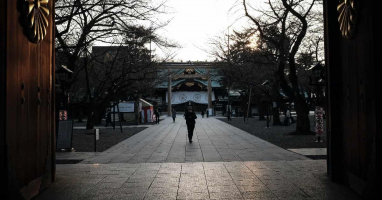
In the case of the Israel-Palestine conflict, the situation is made even more complicated by the fact that victims have been born on both sides for many generations up to the present day. It’s a mix of “ancestral grudges” and “personal grudges.” Once it reaches that point, the situation is bound to become even more complicated. It’s unlikely that the two sides will ever reach an agreement at some point.
“Crescendo” is a music movie, but it has a lot of scenes of discussions. It tells the story of Israeli and Palestinian musicians practicing together. It’s not an easy process. So the conductor, who is the mediator, sets up discussion sessions many times.
Among them, it was impressive how they kept talking about their grandmothers and grandfathers, saying things like “My grandmother was…” and “My grandfather was…” Even though they themselves are constantly subjected to shelling and persecution, they speak more about the “history that their ancestors were forced to endure” than about themselves. And then they lift their voice, “That’s why I can’t allow it.” One of the characters says,
This isn’t a story about history. It’s a story about our family.
That’s the root of the problem’s depth.

If the “damage” comes first and the “conflict” comes later, there may be a fundamental solution. However, after that, the reverse flow changes where “damage” is born due to the continuation of “conflict”. And once that happens, there should be no means to fundamentally resolve the situation.
That’s why I think, “We have no choice but to forcibly put an end to this problem,” even if it means doing so unilaterally. I believe we all need to share the recognition that “fundamental resolution is impossible” and make a judgment that “even though the cause of the problem has not been eliminated and there is no compensation for subsequent damage, this problem ends here.” As I write this, I feel that this is an idealistic and unrealistic solution. However, are there any other specific and feasible means of proposal besides this?

No One Has the Right to Interfere with those Who are Trying to Understand Each Other
Now, building on what I said earlier, I believe that regardless of the issue, nobody has the right to interfere with another person’s decision-making.

Even in the problems between nations based on the background of past history, not all citizens have the same perspective. For example, in the conflict between Palestine and Israel, some people believe “we will never forgive the other country”, while others think “I hate them, but as a citizen, I have decided not to criticize the other side.”
As long as their thoughts do not denigrate the lives or dignity of others, democratic thinking suggests that their opinions should be tolerated. Therefore, I despise people who ignore others’ thoughts and impose their own ideologies.
In the movie, there are also scenes depicting relationships with family. And a character appears who reacts with “I can’t believe playing an instrument with someone from an ‘enemy’ country.”

I think it’s understandable for individuals to have such feelings, which is not praiseworthy, but given the history of both countries, it is unavoidable for individuals to have such emotions. However, I still believe that “restricting other people’s behavior based on one’s own thoughts” should not be allowed, no matter what the reason is.

Even if there are major issues between countries, there is a possibility of improving relationships between individuals from both countries. Such improvements in personal relationships may eventually have a significant impact on the entire country. However, if someone restricts their actions, even things that should move forward may come to a standstill. In any sense, it would be far from “solving” the issue.
International relations are complex and there may even be a possibility that a “third country that wants the Israel-Palestine issue to continue” is indirectly obstructing the improvement of relations. When we start thinking about such things, it becomes difficult to know where to start, but in any case, as I mentioned earlier, I believe that we must forcefully declare “this issue is over”.
I don’t know how to make that possibility a reality. However, I felt that the story depicted in this movie faintly imagines such a possibility.
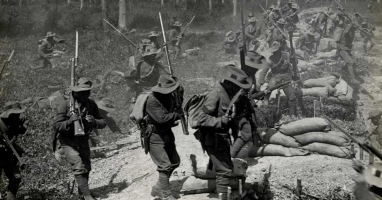
Content Introduction
Retired conductor and university professor Eduard Spork receives a visit from a woman named Karla one day. She has a grand plan to create an orchestra by gathering musicians from Palestine and Israel and have them perform at a peace negotiation conference. According to her, the EU is backing her as a sponsor. Although Spork initially thought he didn’t want to get involved in politics, he eventually decided to accept the role of facilitator.

After that, information about auditions was sent to Israel and Palestine, and young people from both countries gathered at the venue. However, getting to the venue was a struggle. Checkpoints by Israelis are set up at the border of Palestine. Layla presented her properly issued permit, but she was made to feel like she was being harassed by foot stomping. Omar, who came to the checkpoint with his father, was told that his father’s passage was not allowed with the permit he had, and only Omar could cross the border. Omar, who didn’t know the way to the audition venue, was confused, but fortunately, he joined Layla, who was detained at the checkpoint, and the two were able to safely reach the venue.
Spork placed a screen in front of the performers and judged only their performance. As a result, he had to tell Karla that there were hardly any successful candidates from Palestine. This situation is very undesirable, since the “mixed orchestra in both countries” is what is important.

Ron, an accomplished Israeli violinist and successful auditionee who learned of the desperate situation, proposes to Karla that they should “gather Israeli performers who look like Palestinians.” In order to improve the level of the orchestra, they must gather skilled performers, but Palestinians seem to lack the necessary skills. Ron believes that at least they will make it look good if they gather “Israeli performers who look like Palestinians.” Karla rejects the proposal, but as the conductor of the orchestra, Spork is left with no choice but to say, “Then go and gather skilled Palestinian performers.”
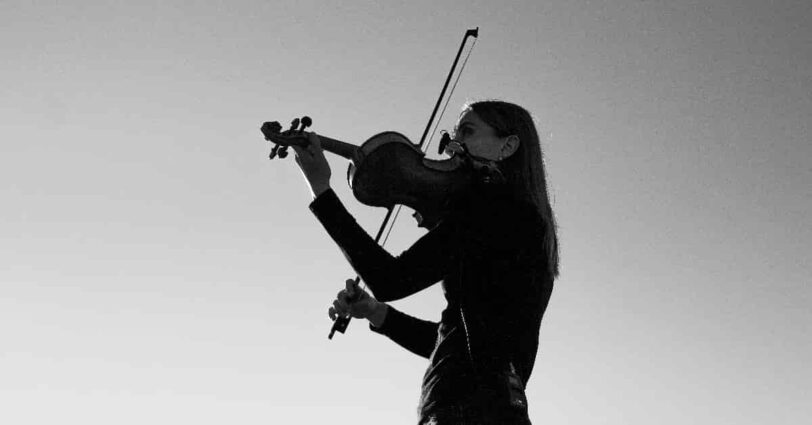
Further turmoil was brought about by Spork himself. He chose Layla, a Palestinian violinist with less skill than others, as the concertmaster. Ron, who thought he should have been chosen as concertmaster, was not satisfied with this decision. Many of Ron’s students were selected as members of the orchestra, and Ron retaliated by inciting his own students to obstruct Layla.

Omar, a Palestinian who came to the venue with Layla, becomes intimate with Shira, an Israeli. It is not the shy Omar but rather Shira who takes the initiative to approach him, and the two deepen their relationship in secret from everyone else. During orchestra rehearsals, there is a lot of time spent talking and arguing without playing instruments. During those times, the two of them watch from a distance. Neither of them seem to be particularly conscious of the difference in their birth countries, nor do they harbor any grudges.
At the training camp, which was held to change the environment, they spend even more time without their instruments. Spork believes they need to understand each other first, but it’s not that easy…

Impression
It was a really good movie. I have no musical background at all, but at the end of the movie, when they played music at a certain place after various twists and turns, I was about to cry.

This movie is a work of fiction, so the story unfolds in a dramatic way as you would expect from fiction. And therefore, they end up having to “perform” in a situation they never imagined, but the music played in that scene was so moving that it made me tremble. It’s not the emotional impact of the “music itself,” I don’t think, because I’m not someone who understands “music” to that extent. However, I can imagine “what kind of feelings the people who picked up instruments in that scene played with,” and it was because I knew the struggles they had gone through to get there that the feelings they put into their performance came through and almost made me cry.
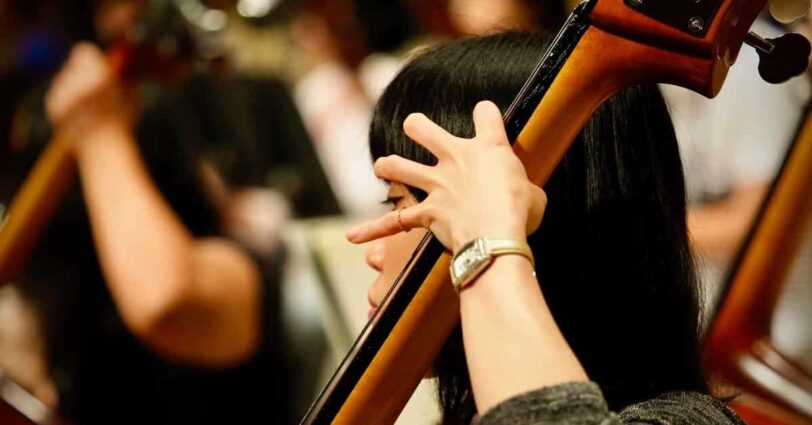
The scene of the performance has no dialogue and only music is playing. And that music strongly conveyed their feelings.
Anyway, I think this movie’s method of depicting the “Israel-Palestine conflict” through “music” is excellent.

I have never played a musical instrument, so it’s just imagination, but the more professional the performer is, the more they should be able to aware themselves that “the overall performance level is low.” And they should easily understand that the reason is that “the feelings of the performers are not united.” The scene where this is clearly demonstrated to the audience is also properly prepared. In the first rehearsal of the training camp, it is revealed that the fundamental problem facing the orchestra is not only technical but also emotional: “the problem of feelings”. They clearly understand that “to make the orchestra successful, they cannot be preoccupied with inter-ethnic conflicts.”
Of course, the story is not that simple. Even if they can understand it intellectually, changing their heart is very difficult.

During the discussion, someone clearly said,
But we can’t change our hearts. Even the teacher can’t.
However, at the same time, they understand that this orchestra is a career opportunity. Just being a mixed orchestra of Palestinians and Israelis makes it highly noteworthy. For those who want to make a name for themselves as performers, it can be said to be a once-in-a-lifetime opportunity. Spork also clearly stated, “Seize the chance.” In other words, the benefits of changing their hearts and becoming one with the “enemy country” are also recognized.

By skillfully weaving together these elements, the “impossible mixed orchestra” has become an existence that has reality. The setting, based on “music”, naturally draws out the conflicts of each country’s people and the dilemma of being a musician.
In addition, Spork’s role as a mediator is also interesting. Although this article does not go into detail about his background, he is also a character who has been involved in “inherent conflict” in a different way than the Israel-Palestine problem. From the beginning of the movie, it is suggested that “there is something about Spork that makes him worthy of being chosen as the conductor of this complex orchestra.” And in one scene, he reveals it himself.


Spork says,
I did anything to wipe off what was sticking to me.
However, in the end, nothing changed due to his own efforts. Unfortunately, Spork is not in a position to declare that “this problem is over.” I think this fact also prolonged his suffering. And perhaps because of such an experience, he also made the decision to take on the role of leading the reckless orchestra, which can only be considered reckless in any way.

In this way, while depicting a complex and complicated background filled with various conflicts, on the other hand, it is interesting as an entertainment work and as a music film. Although it is a story of a world that is hard to imagine, I think there are many things that can be felt from the young people who are trying to move forward on the path of “improvement” in a non-conventional way.
Conclusion
Although the story itself is not based on a true story, the mixed orchestra is real, and the Palestinian-Israeli problem depicted in the movie is still a reality today. Throughout the film, there is a documentary-like atmosphere, and I was overwhelmed by its realism.
It is a work that gives us a glimpse into the reality and possibilities of the world we live in and how the problems that exist all over the world can be improved.

Published Kindle books(Free on Kindle Unlimited)
“The genius Einstein: An easy-to-understand book about interesting science advances that is not too simple based on his life and discoveries: Theory of Relativity, Cosmology and Quantum Theory”
“Why is “lack of imagination” called “communication skills”?: Japanese-specific”negative” communication”

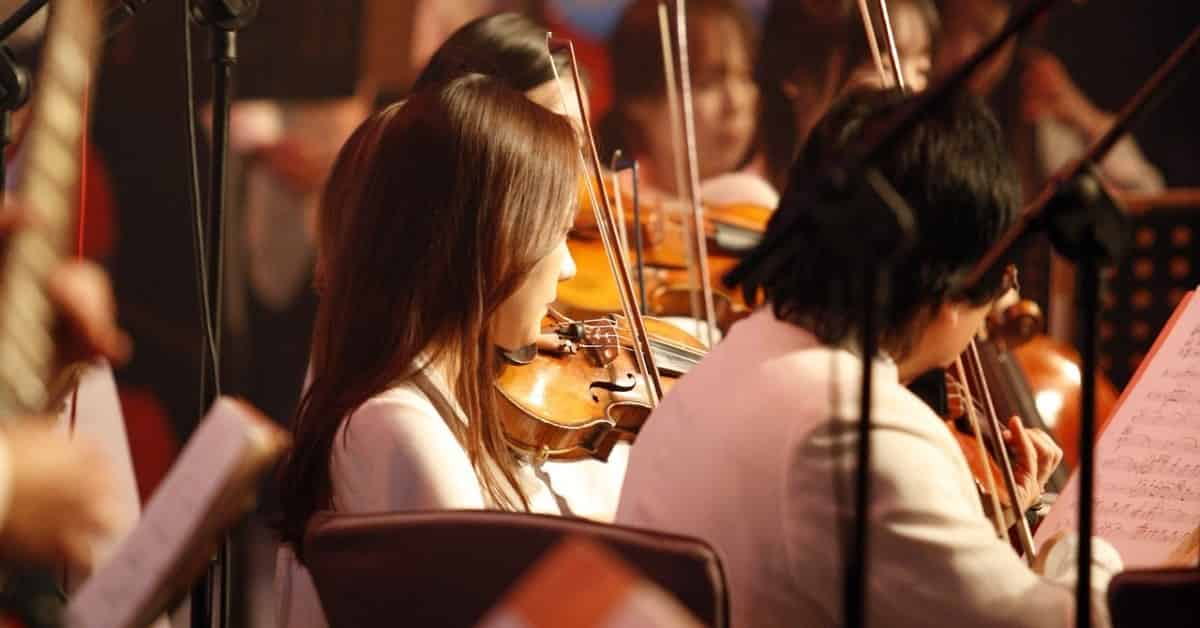





コメント